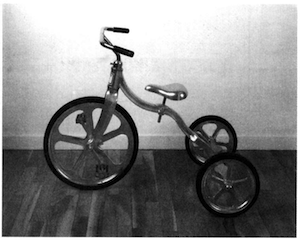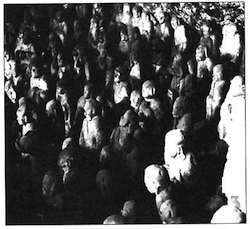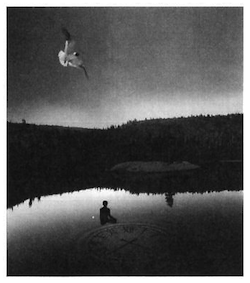Hop Hop Hooray
Thank you so much for the wonderful interview with Jeffrey Hopkins [Summer 1996], reading which I was inspired to consider the implications of imaginary sexual contact with “a man” as some functional identification—in mutuality—with that “generic” image as such.
Hal Papps
San Francisco, California
More of Tricycle’s supposedly white elite liberal readership speaks out:
I have received two copies of your magazine and both had articles written by (or about) admitted homosexuals.
I do not pay my money to take up the cause of homosexuals. I will not renew my subscription.
W. W. Hassey
Montgomery, Alabama
The homosexual Hopkins interview in the Summer 1996 issue was crude and inappropriate for a Buddhist magazine.
(anonymous “New Subscriber”)
If [Jeffrey Hopkins] wants to be gay, let him write for a gay magazine. I do not want nor need this trash in my home.
In case you have run out of toilet paper, I am sending you some [Hopkins’ article was enclosed].
G. Hirsch
Philadelphia, Pennsylvania
I am writing to ask that you cancel my subscription to Tricycle magazine! So far I have enjoyed it very much. It has been a help to me in practice the dharma which I took up in Burma 1942-43. Your article on Jeffrey Hopkins, gay college professor, I cannot accept.
I am extremely with prejudice against all gays and believe they have no rights to live in the United States under any conditions. How they drag into the gutter this beautiful country, which I fought for five and a half years to make it a more decent place to live.
Russell Lindstrom
Superior, Wisconsin
I am somewhat familiar with Tantric art and practices and history, and Jeffrey Hopkins’s adaptation of the tradition for contemporary homosexuals might be some fun and interest if it were only perverse. Instead, it’s embarrassing and pathetic and it just has to be a put-on. And is Mark Epstein really a psychotherapist? Does he practice some sort of “thrill cry therapy” perhaps? It truly is, all of it, beyond parody. The body is holy, as we have heard expressed so many times and so well, and surely Tricycle can find writers who will not make a howlingly funny, humiliating sham out of the precept.
Robert Abel
North Hadley, Massachusetts
 Oy Vey!
Oy Vey!
Do we really need to read Tricycle to find out that what Buddhism really needs is a minyan? Oy vey!
Ellen Moss
Tucson, Arizona
The deconstruction of Buddhism is an important and, I would argue, even crucial, exercise for the development of dharma in the West, and so I read Lewis Richmond’s article with great interest. I agree that “not all Buddhist teaching is equally true and right,” but it seems to me that Mr. Richmond confuses the need to critique and to deconstruct with the impulse to reform. Rather than allow contemporary modes to arise organically from deconstructing the old, he would rather impose new definitions, labels, and names, as if driven more by the fear of ambiguity than by the need to contextualize. While I have experienced this same phenomenon among many Western writers on dharma matters, in Mr. Richmond’s essay this dilemma is heightened by the choices he makes when he attempts to provide us with new possibilities.
The most obvious example of this is Mr. Richmond’s use of the Hebrew word “minyan,” which he identifies as “the minimum number of adults gathered together in order to pray and worship God.” However, the minyan is not any variety of adults; traditionally, it is specifically twelve men. And although Richmond’s vision of the minyan looks a great deal more like group therapy than like people in prayer, the very use of such a gender-specific word, and one borrowed from such a patriarchal tradition, does not seem to present any contradiction for him, or even irony—nor does his humorless suggestion that Buddhism is in need of its own Protestant Reformation. Both suggestions are offered as institutionalized examples of wresting spiritual authority from a hierarchical elder such as a priest or a rabbi in favor of non-mediated communion with God. Yet nowhere in the United States or Western Europe is spiritual vigor or mystical wonder associated with the Protestant denominations.
I appreciate much of what Mr. Richmond had to say about enlightenment, the Bodhisattva Vow, and the need for an interdependent context rather than a hierarchical structure. However, I do not think it is necessary or helpful to burden the fledgling attempts to disseminate dharma in the West with concepts that are so weighted down by their own religious—and very questionable—histories.
abeudrou
e-mail
Lewis Richmond’s idea of minyans as a vehicle to enlightenment is a poor one. It would simply entrench even more deeply an already overly elitist, “star”-centered North American Buddhism.
But there does exist a demographic within which Lew could test his theorem. All of the close students of Suzuki Roshi should form themselves into minyans and teach and learn from one another. Let us see if “spiritual equals” can indeed tell the truth to one another. There are some very hard truths to be spoken.
But I suspect that most of Roshi’s students would rather see their teacher’s maverick form of Soto Zen atrophy than do what needs to be done to have it survive. Why? Well, I suspect that Lew hit it right on the head when he identified “arrogance and pride” as “the last defilement to be conquered.” Presumably it is the seniormost disciples who need to be particularly scrupulous with regard to getting past this final obstruction.
Suzuki Roshi asked specifically that his oldest students help his dharma-heir to preserve his (S-R’s) dharma. That was all “the permission to speak” that was required. Suzuki Roshi made his senior students into a de facto minyan. It doesn’t seem to have worked all that well.
Wayne Codling
e-mail
Lewis Richmond asserts that Buddhism is old, decrepit, rigid, and needs its own Protestant Reformation. Buddhists need to “bridge the gap between the meditation tradition and more devotional schools,” and be more collaborative, by communicating and communing with each other. The Buddhist sangha is too individualistic; it must become a collective.
These are puzzling claims. The Protestant Reformation aimed to reform the Catholic Church. There is no Buddhist Church. Buddhism must have more sects than Protestant Christianity. Most of those sects seem to satisfy different needs and temperaments, from the purely meditative to the purely devotional. A collectivist sangha sounds grim.
Even more puzzling is Richmond’s proposed reformation: Transform Buddhist practices so that they resemble those of Judaism, with sutras in place of the Torah, meditation in place of prayer, minyan or “public truth-telling” in place of dharma talks, and elected Buddhist teachers in place of rabbis. The minyan is to be the new Buddhist paradigm: “minyan is the sangha of the present day.”
Richmond doesn’t explain how his proposal bridges the gap between meditational and devotional schools. In fact, his proposal seems to entail the abolition of these schools. Furthermore, he doesn’t indicate how his proposal benefits Buddhists whose backgrounds are not Jewish or liberal Protestant, and who are unfamiliar with, or who would dislike, “public truth-telling.” In light of his preference for a collectivist sangha, perhaps he thinks the answer to this issue is “Come the minyan, you will like public truth-telling.”
Peter Eggenberger
Oakland, California
 All a-Lawn
All a-Lawn
I read with interest the various techniques for walking zazen [“On Practice,” Summer 1996]. I wondered after reading the article how I might incorporate this new practice into my everyday life. However, it was not until the next day, as I went through my normal Saturday routine, that it dawned on me—I have been practicing this for many years already, but have been calling it something else: Mowing the Lawn!
Matthew Johnson
Cape Coral, Florida
Platform Sutra
Sam Hamill’s liberalism requires Big Government Buddha to tax and spend in order to fill the national annual quota for compassion [“UnCommon Sense,” Summer 1996].. But the power to tax is the power to destroy, which does not sound very Buddha-like to me. Perhaps the “letting be” of moderate Republicanism is more Buddha-like than the Democratic party’s engaged bureaucrats (an oxymoron?).
Thomas Fischer
Houston, Texas
I appreciate your magazine because it helps me to keep a pulse on the state of American Buddhism. So I get concerned when you print political commentary columns such as the one by Sam Hamill in the Summer 1996 issue. In this column, prominent conservatives such as Rush Limbaugh and Newt Gingrich are blasted as being “extreme right wing.” This kind of political commentary in a Buddhist magazine only furthers a stereotype that all American Buddhists are bleeding-heart liberals. By furthering this stereotype, I am afraid that those who have conservative beliefs may be turned off by Buddhism before they ever give it a try.
Personally, I have strong conservative beliefs. I am also a Rush Limbaugh fan, and “ditto-head.” And, for the past several years, I have been quite devoted to the practice of Buddhism. In my studies of Buddha’s teachings, I have found many things that reflect conservative ideals (for example: self-responsibility, kamma, and moral precepts). This is what initially encouraged me to give Buddhism a try. Without that encouragement, I may never have discovered what an excellent religion Buddhism is. And I also may have never become aware of that peaceful place where labels such as “liberal” and conservative” do not apply.
Albert Johnson
Yucca Valley, California
Mr. Hamill’s article is such a dinosaur of elitist thinking it should be put in a museum of archaic political thought, definitely not in a progressive Buddhist magazine.
Mr. Hamill believes that only liberals care about the poor, unwed mothers, and hungry children. I am not a politician, but I do know that after fifty years of welfare-based programs our problems are only growing, not shrinking. I don’t know if anyone has the answers, but his presumption that Republicans only care about tax cuts for the wealthy and B-2 bombers is an example of divisive thinking of exclusion instead of inclusion, of “we are better than they are because we care more” thinking.
Republicans love trees, salmon runs, and safe inner cities as much as Mr. Hamill does. But ours is a complex world. Our Democratic president granted China most-favored-nation status despite outrageous human rights violations. As a country, we have always flipflopped between isolating and empowering our problems. But if knee-jerk liberalism becomes synonymous with American Buddhism then indeed our hands will be empty, and we will have nothing to offer in the way of a new vision to heal our nation’s problems.
Tatjana Soli
Santa Ana, California
The Gender Thing
I was rather . . . shall I say . . . ticked off when I read the review of Women, Men, and Angels [“Book Reviews,” Summer 1996]. Being a thirteen-year-old, I don’t know everything (but hey, Siddhartha Gautama didn’t either—he just happened to reach enlightenment before me), but I believe Subhuti is letting his egotistical hopes venture into his writing.
The Buddha taught that everyone was a part of everyone else. What did Subhuti mean by saying, “a man’s body grounds him less in the immediate, for he is not tied to the menstrual cycle and the necessity of sacrificing self for the moment by moment needs of children”? Well, I’m sorry that I have a nasty case of PMS, and I was granted the gift of making OUR children. I’m not “sacrificing” anything either. Someday it will be my decision to bring new life into the world.
Lesandre Barley
Running Springs, California
e-mail
It was illuminating to read Anita Doyle’s review of the book Women, Men and Angels by Subhuti. I was amused by the gentle wit with which she lampooned the specious arguments of a phallocentric essay in narcissism, and saddened, as a male Buddhist, that this kind of literature is still being written—this close to the end of the twentieth century.
The Buddhist vehicles sometimes offer striking contrasts. For example, it may have aided Anita Doyle’s discussion to have known that Tantra does not regard menstruation as problematic for women practitioners. Menstruation is a powerful physical juncture for the experience of emptiness. As the emotions move into flux, and the definition of personality becomes “unstable,” it becomes ever more possible to let go of reference points. The dakini is often depicted cradling a skull bowl in her left hand. This bowl is “filled to the brim with frothing oceans of menstrual blood”—hardly a symbol that points to the inferiority of women and female processes. As Anita Doyle points out, the field of child-rearing is rich with opportunities to develop experiences of active-compassion and emptiness. The male monastic ideal may have benefits, but it might be prudent to question the possibilities for self-deception it provides. It may be that to sit in denial of life, in the anaesthetized, emotionally sanitized environment of a monastery, is simply self-cherishing escapism in comparison with the raw dynamism of family life.
Dr. C. Togden
Penarth, Wales
Gender considerations are, of course, secondary though not unimportant in the perspective that we are all trying to gain Enlightenment, yet this overarching premise of Subhuti’s writing was omitted from the review. Indeed, the book needs to be carefully read to understand the exact nature of Sangharakshita’s ideas or one can, as Anita Doyle does in her review, miss that “spiritual aptitude is augmentative” (i.e., as men and women develop spiritually, their aptitude grows) and that it is “consistent” oppression of women by men that is being questioned.
In a healthy sangha where concern for each other’s spiritual welfare is paramount, discussion on any topic, including this one, should be possible. Far from “docile ranks” I would describe my experience of the Western Buddhist Order as alive with often vigorous debate by both women and men on a wide range of issues. My experience as a woman within this movement has been largely that of opportunity and encouragement.
Dharmacharini Vidyavati
e-mail
 Mountains and Oceans
Mountains and Oceans
I was surprised that your editors let Dan Leighton get away with making Dogen Zenji an ecologist in “Being Time Through Deep Time” [Summer 1996]. In substance, I agreed with what Leighton said (with regard, for instance, to the long-term hazards of nuclear waste), but in giving an ideological spin to Dogen’s famous statement “Mountains and oceans are time,” he diminishes his own argument. Time cannot be separated from being. That is what Dogen is saying. It’s a simple truth, but a profound one. All of the many tucks and folds of Dogen’s language, the whole of his philosophy, turns back upon that single point, which has nothing to do with ecology, or ideology of any kind.
R. Dobbins
email
Thank you for subscribing to Tricycle! As a nonprofit, we depend on readers like you to keep Buddhist teachings and practices widely available.